Ye what ho and verily thus, ILTBTA readers! If that made no sense to you, then clearly you still need to gird your loins to prepare to enter the realm of this post’s subject: The Lion in Winter. This is a dense one, so let’s waste no time and jump right in!
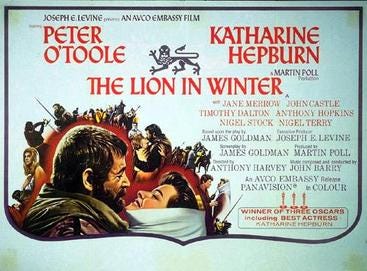
Previews
What, if anything, did we know about this coming attraction before we watched it?
Ellen: This one has been on my list for ages! An absolute classic, it… nah jk, I have never even kind of heard of this baby. I searched random titles from the ‘50s and ‘60s, and I love some palace intrigue!
Tyler: I, too, know diddly squat about this movie. Based on the brief plot synopsis I read when picking it, it seems like Succession in the 12th century, which could be fun? Let’s find out.
Plots & Feelings
This one’s pretty self-explanatory.
Short Version (courtesy of IMDb): 1183 A.D.: King Henry II's three sons all want to inherit the throne, but he won't commit to a choice. When he allows his imprisoned wife Eleanor of Aquitaine out for a Christmas visit, they all variously plot to force him into a decision.
Long Version (modified from Wikipedia and formatted to fit your screen):
There’s a lot of key information that this movie made us figure out for ourselves in confusing and circuitous fashion. Because I love you, Dear Readers, I’ve summarized it below1:
It’s the winter of 1183, and medieval trumpets blare while the credits roll over a backdrop of various gargoyles and grotesques2. Swords clash in the training yard of King Henry’s domain as he spars with his youngest son, John. The acned teen is summarily smoked by his father before continuing with another knight, while the old man goes to lounge with his mistress Alais, sister to King Philip of France. Henry reflects upon wanting to keep his kingdom whole upon his death, which is why he plans to name John as his successor. Queen Eleanor wants to name Richard. No one wants to name Geoffrey3. Alais only cares that she’s the one he loves: not his wife, and not the deceased mistress Rosamund. Henry is going to solidify his plans this Christmas and mandates that everyone must come to his estate at Chinon for the festivities. Captain Marshal rustles up the other boys Richard and Geoffrey from the jousting arena and the battlefield, respectively. Last of all is Queen Eleanor, under a 10-year-and-counting house arrest at Salisbury castle. There’s no place like home for the holidays!
Tyler: All of the sword fighting looked almost too realistic and era-appropriate with how heavy and unwieldy they look. Poor teenage John wasn’t the only one struggling with the heft!
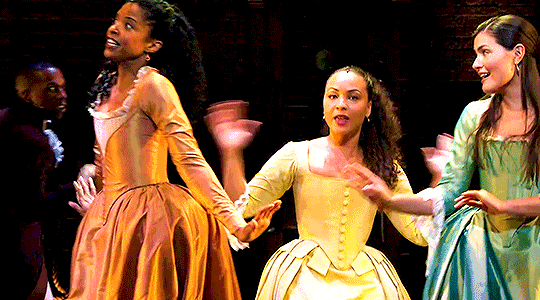
At Chinon, Alais is horrified to hear that part of Henry’s plan is for her to marry the sixteen-year-old John. She understandably wants no part of this Scrappy Doo situation, especially not when he “has pimples and smells of compost.”4 Henry insists this is just to keep her dowry, and he’ll still use her as he likes5. The brothers all meet in the castle yard and are immediately bickering and immature, because brothers do be like that. Eleanor, meanwhile, arrives via royal barge across the channel, looking composed and regal as can be. She greets her husband and sons with a fake smile, and they all turn those fake smiles on the just-arrived French delegation, led by King Philip. Once inside and gathered around the world’s shaggiest Christmas tree, everyone performs their opening posturing (see table above). With nothing resolved, Philip and the boys eventually leave, and conversation turns to Rosamund. Alais eventually can’t handle Henry and Eleanor’s weirdly flirtatious but hateful dynamic anymore and also departs. We learn Eleanor has attempted several civil wars against Henry and nearly won the last, which is why she’s locked up. They leave arm-in-arm for dinner, vowing to destroy one another.
Ellen: There’s a point where Eleanor makes a crack about the exact number of days Rosamund has been dead, and Alais is like WTF. Then Eleanor giggles to herself and says she just picked a number for fun. So that’s who we’re dealing with!
Tyler: Eleanor appears to have negative fucks left to give and is embracing chaos and mind games at every turn. She’s like if Lucille Bluth hated her family.
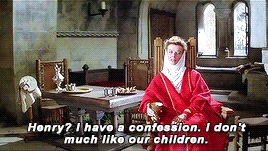
Later in the courtyard, the depth of the hatred and mistrust everyone in this family feels for each other is evident. John is an emo little baby, complaining that if he were on fire, no one would piss on him to put it out. Geoff whines about always being ignored and then tries to go toe-to-toe in baffling strategy and doubletalk with Eleanor, which is nearly incomprehensible to the viewer but somehow ends in him telling her to rot and her being confident he’s on her side if she needs him. Alais continues to gamely insist that she could be a lot of trouble if she wanted to. Richard makes clear he thinks his mother is a snake in the grass6, but her manipulations seem to result in her believing she can get the Aquitaine from him if need be. Henry, meanwhile, observes from a window above.
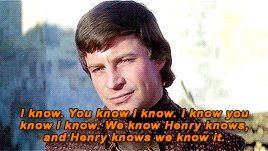
Back inside the castle, Henry decides he wants to meet up with Philip in one hour. And what, pray tell, is Philip doing right now? Playing chess with Geoff! The perpetual middle child suggests that Philip could regain quite a bit of France if he were king, and Philip “promises”7 an army. Meanwhile, Henry and Eleanor are debating who slept with whomst throughout their marriage (quite a few people for both of them, it seems!). The Queen is insistent she’ll never give up the Aquitaine… until Henry offers her freedom. It seems to be decided: with tears in her eyes, Eleanor agrees to give John the Aquitaine in exchange for her freedom and Richard marries Alais and is named successor. She has just one catch: the wedding happens now. She goads him by suggesting she might have slept with his father, and Henry springs into action, demanding “someone dig [him] up a priest!” The family (such as it is) shuffles their way to the chapel, but the ceremony is stopped abruptly when Henry reveals the terms to Richard. The eldest son threatens to go to war, so Daddy puts him on house arrest. The miscreants disperse, and Alais is furious he almost gave her away. Henry couldn’t go through with it, and while he tells Eleanor he has no idea what the next move is, he does know he’s winning. Eleanor asks them to show her their loving kiss, because I guess she hates herself too.
Tyler: Two random comments that I couldn’t find a bullet-home for but wanted to share. First, I very much am into a royal household where there are just oodles of dogs lying around everywhere. It seems like some of these people could use a good therapy dog … It’s also jarring to hear Henry talk about being basically decrepit at 50 years old, even saying he’s “got ten years on the Pope!" Imagine a 40-year old pope today!

In her quarters, Eleanor dejectedly examines herself in the mirror and muses that though she lost this time, there’s always next Christmas. Her reverie is interrupted by her ding-dong children. Geoff’s upset because his parents never show him more than indifference, Richard’s mad because Eleanor was going to sell out the Aquitaine from under him, and John actually just came to gloat. Knives are pulled but not used, and Eleanor has a moment of simply wishing they would all love each other. We return to our regularly scheduled scheming when John reveals he made a plan with Philip to go to war because he believed the Richard-wedding debacle, whoops! Each son goes to Philip’s chambers for his own machinations, and each hides in the tapestries as the next arrives. Richard is last, sent by Eleanor because of their past friendship. The two old friends talk, and it becomes clear that they were much more than friends. Our final knock at Philip’s door comes, and Richard hides as Henry enters. They make little progress, and Philip says there’s no point in him fighting Henry when his sons will do it for him, and oh yeah, I never loved Richard! The aforementioned Richard bursts forth, yelling that it wasn’t like that, and each subsequent son materializes to scream about how much they hate their father (perhaps because his favorite is still the deceased Young Henry). Henry looks around and laments that his life will read better than it lived, and he disowns them all.
Ellen: Geoff point blank asks Eleanor why neither of his parents ever think of him, and she either cannot or will not answer. Knowing the source is partly historical, it kind of seems like there just wasn’t much info on Geoffrey and it’s like the script left a note like “INSERT JUSTIFICATION HERE” and it just never got filled in. Also this was a heavy plot bullet point, but I did not see the Richard/Philip situation coming!! Juicy.
Tyler: Me neither! But yeah this movie is thicc with plot in some places and thin as a rail in others. There's so much we don't know about these interpersonal relationships (e.g., why does Alais love Henry, why does everyone hate Geoffrey, etc.) but we're stuck just having to accept it without explanation.
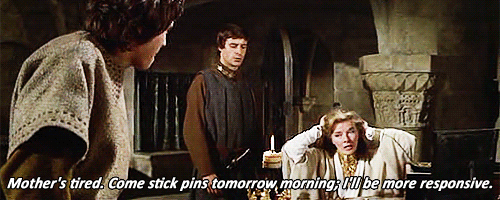
Henry wails and gnashes his teeth down the hall, saying he has no sons left. He won’t even talk to Alais, but Eleanor does. The two talk while Alais makes mulled wine (or do you say mold wine?). Eleanor confirms that she never poisoned Rosamund, and though Alais insists what she’d like for Christmas is to see Eleanor suffer, the two women hug it out. Henry returns and kicks Alais out, and Eleanor is like “I’m tired, I’ll sign whatever you want, I’m done.” They run through how they’ve ruined everything they’ve touched, and they share a rare, tender moment reminiscing on their first meeting and how they “shattered the commandments on the spot.” Henry closes by announcing he does want an annulment, though, so he can get new sons. Eleanor refuses and vows to delay him, but Henry throws his sons in the wine cellar and readies himself for a trip to Rome. Eleanor meanwhile sneaks with a guard to the cellar to give the boys knives, because for Henry’s plan to work, he either has to keep them locked away forever or kill them. There’s a clang, and Henry and Alais arrive in the cellar. A knife fight ensues, and Henry gets the upper hand on Richard… but he can’t do it. The annulment plan is abandoned, and everyone is let out. As Henry walks Eleanor down to the boat, he promises to let her out at Easter for another chance to strike him down, and they both belly laugh as she’s rowed across the channel.
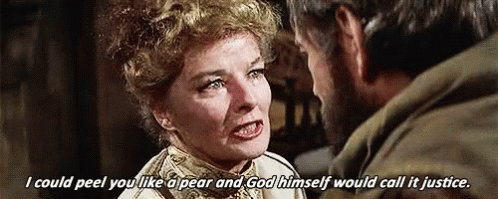
Intermission
Even though ILTBTA is free, please indulge us further and enjoy this quick “advertisement.”
This installment of ILTBTA is brought to you by … knives!
Need something to literally or figuratively use to gain control in your family’s quest for power? Or just looking for a fresh kitchen utensil to slice and dice your veggies? Get a knife! They’re currently all the latest rage amongst members of the royal family and Rian Johnson. Just the other day, Prince Richard was seen walking around with one in his back!
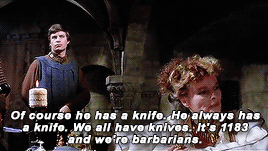
Tell your local blacksmith that ILTBTA sent you and they’ll throw in a free carrying case!
Knives: minimize strife (and maybe protect your life) from your wife with a knife!
Wiki-Wiki-Whaaat?
Love a good Wikipedia rabbit hole in search of some fun facts? Us too.
The Lion in Winter’s Wikipedia page has some interesting facts and anecdotes that we recommend you read through, but here are a few of our favorites:
The Lion in Winter is based on a 1966 play of the same name written by James Goldman. The play premiered on Broadway at the Ambassador Theatre in March 1966. Despite the play losing $150,000 and getting poor reviews, producer Martin Poll enjoyed it enough to hire Goldman to also write the screenplay. Goldman would go on to win the Oscar for Best Screenplay - Based on Material from Another Medium (later changed to Best Adapted Screenplay).
Ellen: I’m so glad it won for Screenplay, because I loved the writing. There were several instances in my notes where I wrote direct quotes because I enjoyed the turns of phrase so much.
With respect to the historical accuracy of the play/film, there’s a mixture of fact and fiction involving revolts and rebellions, failed rulers, and deaths. Most interestingly, John (who eventually rose to the throne in 1199 after his brother Richard’s death) is said to be the villain in the Robin Hood legends.
The film was the first major film role for Anthony Hopkins (who played Richard) and film debut for future Bond Timothy Dalton (who played Philip). Bond producers Albert R. Broccoli and Harry Saltzman even offered Dalton the role of James Bond to replace Sean Connery in On Her Majesty’s Secret Service, but Dalton felt he was too young for the role, so it instead went to George Lazenby, a model with no prior acting experience. Dalton would of course eventually end up portraying Bond in 1987’s The Living Daylights and 1989’s License to Kill.
Tyler: It blows my mind that people watched the character of Philip and said “Yep, that’s the suave British spy we all know and love.”
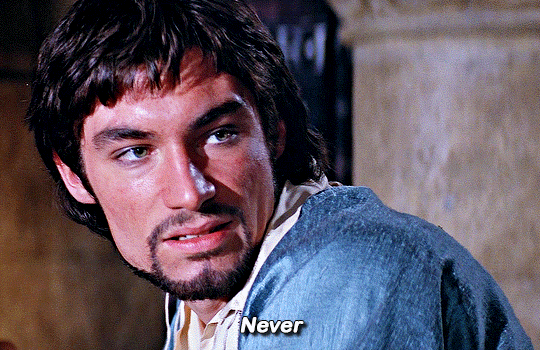
This was actually Peter O’Toole’s second time portraying Henry II: he played the king in 1964’s Becket alongside Richard Burton. O’Toole was nominated for an Oscar for Best Actor for both portrayals, two of his eight nominations for the category (though he never won).
Katharine Hepburn, on the other hand, was much more popular with The Academy. She has won four Best Actress Oscars (the most of any performer) out of twelve nominations. She also holds the record for longest time between first and last Oscar nominations, with her first nomination (and win) coming for Morning Glory in 1934 and her final nomination (and win) coming for On Golden Pond 48 years later in 1982.
Oddly enough, her Best Actress Oscar win for The Lion in Winter was shared with Barbra Streisand for her work in Funny Girl, one of only six times there was a tie at the Oscars. Ms. Hepburn also won the award the previous year for her work in …
Honorable Mentions
What other movies should you be watching?
Guess Who’s Coming To Dinner is a 1967 dramatic rom-com starring Sidney Poitier, Katharine Houghton, Katharine Hepburn, and Spencer Tracy. Hepburn and Tracy (in their ninth and final on-screen pairing) are a wealthy San Francisco couple whose daughter Joanna returns from her Hawaiian vacation with a fiance after a whirlwind romance. Little do her parents know, her extremely successful and attractive fiance John is (GASP) black! As Joanna’s parents struggle to come to terms with the interracial relationship, things get even more complicated as John’s parents arrive and are equally shocked that their child is engaged to someone outside his race.

Released just six months after the landmark Supreme Court case that struck down laws against interracial marriages (it was still illegal in seventeen states), GWCTD is a well-made and thought-provoking movie that deals with some obviously sticky subjects. As Ellen says in The Spreadsheet, “I'm grateful to have watched this when I could pause a lot and discuss because while it's not perfect, it's very very good!”
Guess Who’s Coming To Dinner is available to rent from all the usual places.
Fill In The Blank
How did we really feel about The Academy nominating this?
Ellen: I’d like to share some mold wine and spread Christmas cheer with The Academy. This was an interesting brand of intrigue in which everyone’s deceit and machinations were immediately revealed, and yet I still didn’t fully understand it. It’s a situation where every conversation isn’t just about what it’s about, but also about a lifetime of trauma and resentment that led to this point. That being said, Katharine Hepburn was really charming while also being kind of insane. Peter O’Toole yelled every other line, which did lend extra weight to ones he said softly, but my guy: there are other ways to show contrast! I felt kind of whatever about the other performances. In contrast, I absolutely loved the writing. The specific word choice was really enjoyable, even if the plotting was perplexing.
Tyler: I’d like to buy The Academy some corkboard and red string so it can explain the various schemes shown (and not shown) in this movie. I got exhausted trying to keep up with everyone's actual intentions and the bold face lying around their stated intentions. Poor John was made out to be an idiot for not catching on, but without a LOT of necessary background and context, I felt like I was right there with him. It's harder to get away with that in a movie where you’ve got limited time, especially compared to an entire season of a TV show (of, say, Game of Thrones or Succession) where schemes and motives unfold over the course of many hours. That being said, I thought the dialogue was very well-written and Katharine Hepburn did a fantastic job with what was given to her. And I totally agree with you on Peter O’Toole: there was too much yelling and ~dramatic~ acting (read: overacting) for my liking.
Let The Credits Roll
Thanks for reading! Some quick housekeeping as you exit the theatre:
If you have plots and feelings of your own (on the movie or ILTBTA in general), feel free to comment on the post or simply reply to the email. If you liked reading this: tell your friends! If you hated reading this: tell your friends how much you hated it by forwarding it to them!
If you’re a weirdo like Tyler and use Twitter, feel free to follow us there @BlankTheAcademy for ILTBTA updates, rejected jokes, and other random movie-related musings. Once we reach a million followers, we’ll offer to purchase the @ILTBTA handle from the butthead who snagged it before us.
If you’d like to start a wild Best Picture journey of your own, feel free to download a copy of The Spreadsheet. Bonus: checking off the boxes is oddly satisfying.
Post-Credits Scene
Get a sneak peek at the next ILTBTA installment.
Pay your fare and find a seat quickly because for our next post we’re allllllll aboard to watch Elia Kazan’s 1951 drama A Streetcar Named Desire. Starring Vivien Leigh, Marlon Brando, and Kim Hunter, Desire follows a Southern belle who seeks refuge with her sister and brother-in-law in New Orleans’ French Quarter. Presumably, shenanigans follow.
ASND is available to stream for free with a subscription to HBO Max, and for $2.99 elsewhere.
Until then, keep your enemies close and your lions closer!

Tyler: For those of you who didn’t read/remember our first Honeymoon Episode post, when we say “I” here, this is all Ellen. I wish I had this table handy when watching the movie.
The difference is that gargoyles specifically have a spout for water to run off the roof, whereas grotesques (despite their name) are merely decorative. If for some reason you want to remember this, you can imagine how gargoyles gargle the water!
Tyler: Geoffrey looks like an unholy mashup of Ron Desantis, Jason Bateman and Mark Hamill.
Ellen: Well, I guess that makes my choice of who to root for Eleanor or no one!
Sounds like my ex-wife!
Look, you can’t trust any of these bitches.





